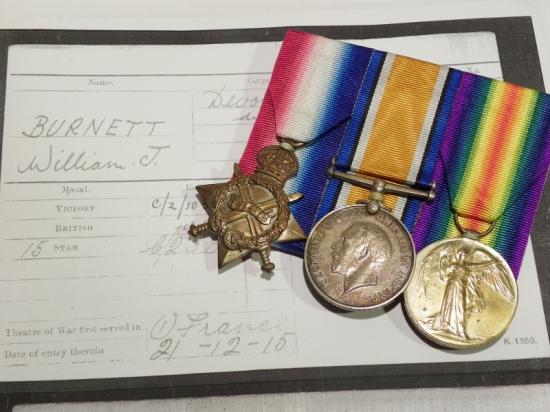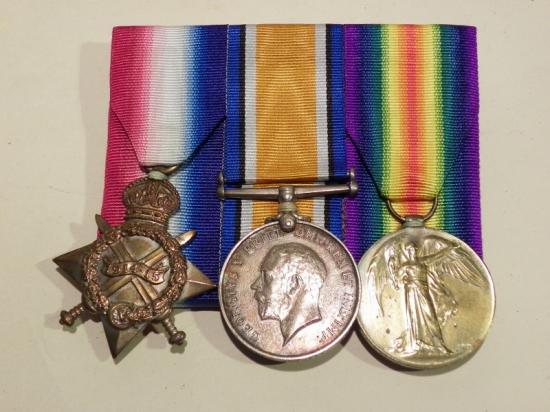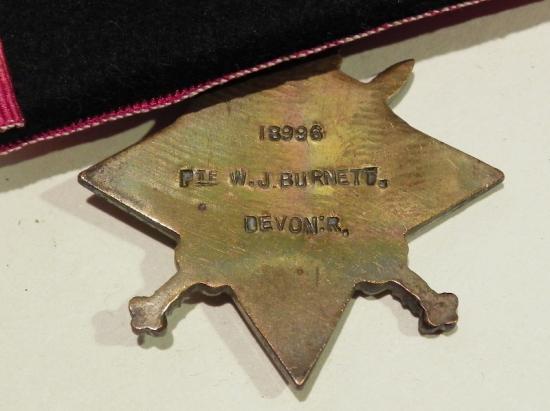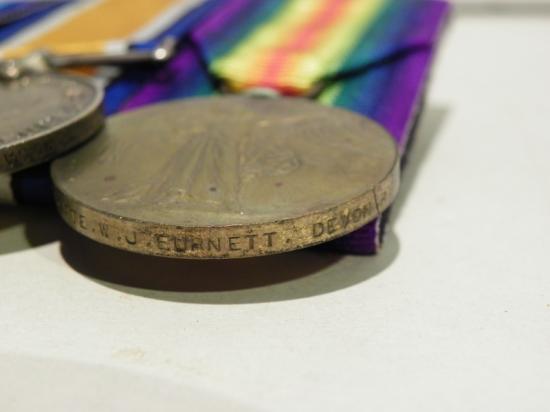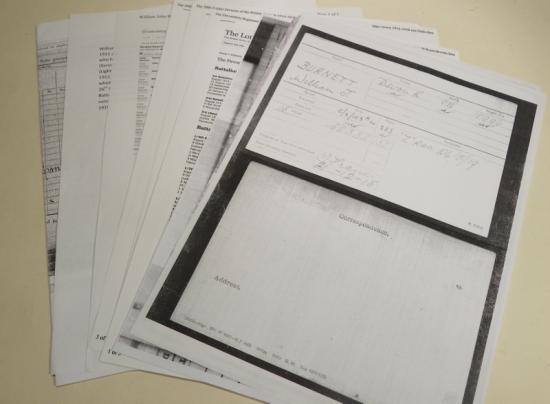1914/15 Star Trio to Burnet Devon Regiment Served Salonika.
1914/15 star, British war and Victory medal pair all correctly named to 18996 Private William James Burnett of the Devonshire Regiment.
William John Burnett was born around 1881 in Wellington Somerst and first entered the war in France on the 21st December 1915 as part of a draft of troops for the 9th battalion Devon’s, who had been in France since 28th July 1915. The 9th battalion formed part of K2 attached to 20th light division as divisional troops. at soon as his arrival in France, William was transferred to the 10th service battalion of the Devon’s, they formed part of the 79th brigade, 26th division. The division concentrated at Flesselles and moved to Salonika via embarkation at Marseilles. On 26 December 1915, units began to move from Lembet to Happy Valley Camp and all units were in place there by 8 February 1916. The 26th Division remained in the Salonika theatre for the rest of the war. Although the Allies had 250,000 men they lacked the necessary equipment and supplies to fight along a 250 mile front. The front stretched from Albania to the mouth of the River Struma in Greece.
In the beginning of August 1916 three French and one British divisions with 45,000 men and 400 guns launched an offensive against the Bulgarian positions at Lake Dojran. The attack began on 9 August with heavy artillery fire on the positions of the 27th Chepino Regiment and 9th Plovdiv Regiment. All four attacks that followed on 10th, 15th, 16th and 18th August were repulsed by the Second division and the Allies were forced to retreat to their original positions with heavy casualties. The only real success was the 7th Battalion of the Oxfordshire & Buckinghamshire Light Infantry took Horseshoe Hill. Up until the start of 1917, positions pretty much remained the same, but attacks were planned for February, a major assault in the direction of Vardar and Doiran and on 9th and 10th February the Allies attacked the 33rd Svishtov and 34th Troyan Regiments but were repulsed by a decisive counter-attack by the Troyan Regiment. The British advance on 21st February was repulsed by Bulgarian artillery after a heavy two-day battle. The Allied command found that the Bulgarian positions were better fortified than in the previous year, so it ordered a systematic artillery barrage on these defenses. In the meantime, it continued the development of their forming-up ground which was 800–1,500 m from the defensive lines of the Pleven Division. To make the breakthrough, the British concentrated three divisions, the 22nd, 26th, 60th, with its artillery and more than 43,000 men. The battle for a breakthrough in the Bulgarian positions began on 22 April and continued intermittently until 9 May 1917. It was a arduous battle with attacks and counter attacks, in between long artillery barrages from both sides, one barrage, the Bulgarian artillery fired 10,000 shells in one hour. Due to criticism by their high command, the British made new attempts at a breakthrough. On 8 May, after a long artillery barrage, they began another attack. The main assault started at 9 pm with five waves of British troops including the Devon’s attacking the Bulgarian positions. After four attacks during the night of 8th and 9th May the British were defeated and suffered enormous casualties. A Times correspondent wrote that the British soldiers called it "the valley of death".
In early 1918 the division lost a number of units, sent back to France to bolster the losses on the western front. The 10th Devon’s stayed in Salonika and further efforts were made to take the Bulgarian line near lake Doiran, once again the British-Greek assault failed, with the attackers sustaining over 7,000 casualties, but the Serbs broke through in the mountains to the west. With no reserves and a starving population at home, the Bulgarians were forced into a general retreat, harried by the pursuing Allies. Bulgaria finally signed an armistice on 28 September 1918.
Somehow, Private William Burnett survived the Salonika campaign, called “the side show” by troops serving on the western front, it was anything but. The conditions for the men were terrible, lack of supplies, disease and the extremes in weather conditions. overcoats were frozen hard, and when some of the men tried to beat theirs to make them pliable to lie down in, they split like matchwood. The men could hardly hold their rifles as their hands froze to the cold metal and many lost hands and feet due to frostbite. In contrast, these same men faced a boiling summer climate and many succumbed to heatstroke; that all aside from the heavy casualties during the fierce fighting that took place, and of course the Mosquito. The 26th Division had suffered casualties of 8,022 killed, wounded and missing during the war but vastly larger numbers sick with malaria, dysentery and other diseases rife in the Salonika theatre.
William would have been discharged on 24th may 1919 after serving three years in one of the worst places on earth. Sadly William died on 28th February 1929, where he lived at ‘Redlands’ Queens Road, Salisbury. He was 48 years old. He never got to see much of the freedom he fought so bravely for.
His medals are in excellent original condition and have been court mounted with modern ribbons on a Firmin medal bar. They comes with copied medal index card, medal rolls etc, and copied divisional information.
Code: 26941

